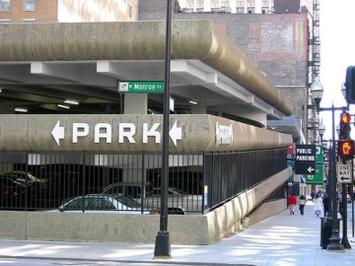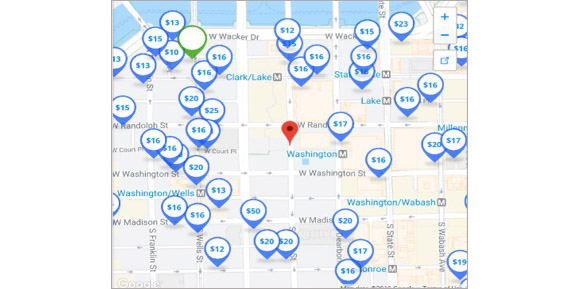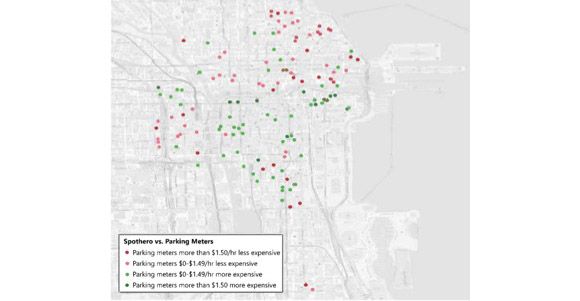
Parking, it is hardly worth mentioning, fails to capture the imagination of most people who study the dynamism of American cities. Typically, the news media and blogosphere cover parking only when a controversy erupts or chronic shortages loom. While attention is showered on smart-phone apps for bikesharing systems, e-scooters networks, and ridesharing, apps that improve off-street parking are barely acknowledged in most discussions about mobility.
But to overlook the spectacular rise of parking reservation apps over the past several years is to miss a crucial aspect of the evolution of urban transportation. Parking booking intermediaries like Parking Panda, ParkWhiz and SpotHero are changing the way motorists find and pay for off-street parking in dramatic ways. Thousands of parking facility operators list available spaces in their garages and parking lots on these platforms to gain a marketing edge while maintaining control over rates charged and the number of spots reserved. These intermediary platforms, operating on a commission basis, facilitate comparison shopping much like Expedia and Travelocity, allow customers to reserve spots in advance, and provide new digital conveniences, ranging from payment via phone to entry codes sent via text.
Millions of people, many of whom rely on Lyft or Uber for some trips but use their personal vehicles for others, have become loyal users of parking reservation apps. And on the supply side, homeowners and businesses find listing their extra parking spots on these intermediary apps an easy way to make a few extra bucks.
The Parking Dilemma
For cities, the expansion of parking booking intermediaries should be seen as instrumental to alleviating some of the most stubborn inefficiencies long associated with off-street parking. Prior to their emergence, many parking facilities were in a technological backwater. Many adhered to a “first come, first served” approach to allocating parking spaces without adjusting prices in response to market conditions. Periodical shortages and surpluses of parking became unavoidable as a result.
Accustomed to these problems, many motorists—by choice or necessity—choose to drive to their destination without a clear understanding of the parking options available upon arrival. Many end up “roaming” in search of a better deal. The effect on traffic can be significant, with roaming in some areas accounting for as much as 30% of vehicle miles.
Our newly released study shows how parking booking intermediaries are heightening the sophistication of the market for off-street parking. This study, while independently conducted, was commissioned by SpotHero (full disclosure) in order to allow for a rigorous statistical assessment of the parking ecosystem. Our review encompassed 7,400 prices at 502 parking facilities in Chicago, Illinois.
We found, as many users undoubtedly know, that parking booking intermediaries facilitate comparison shopping. On a typical weekday in downtown Chicago, there are 383 and 144 parking facilities listed on SpotHero and Parkwhiz, respectively, whereas even the largest websites of parking facilities operators made available between 19 and 45 options. Prices listed on these intermediary platforms also tend to be about a third less on average than prices for drive-up purchases.

Search results showing the prices and locations of available options in the Chicago Loop district for a SpotHero search
More surprising, though, is the extent to which prices listed on parking booking platforms fluctuate akin to the more dynamic pricing of airlines, hotels, and ridesourcing companies like Uber. For three hours of parking beginning at 3 p.m. versus 6 p.m., our study found that prices or availability on SpotHero changed 35% of the time, whereas drive-up prices and prices on parking facility operator websites changed only 24% and 8% of the time, respectively. Most changes to drive-up prices were standard evening discounts identical day after day, whereas prices on parking reservation apps change in response to many factors.
Such dynamic pricing is fostered by algorithms developed by parking booking intermediaries that help facility operators determine their optimal pricing. These tools recommend price adjustments in response to competitive actions and shifts in supply and demand. As a result, individual parking facilities tend to regularly appear and disappear on these reservation apps in response to facility-specific circumstances and local demand conditions. On SpotHero, for example, the number of options rise by about 70% from the morning to the evening.
Advanced Features on Parking Reservation Apps
Digital conveniences offered by parking booking intermediaries allow customers be more
precise in the amount of parking they purchase. Reservations can be cancelled before you arrive or extended after you park your car or get to the office, which was previously not possible at most garages. In fact, more than 20% of parking facility operators we observed do not even allow you to pre-purchase a reservation on their official website.
Parking booking intermediaries also reduce incentives for customers to roam, which can be seen by comparing prices for parking facilities (standardized by hour) listed on SpotHero and the city’s on-street parking meters (which vary in price from $2 to $6.50 per hour). The green circles on Figure 2 are instances where facilities on SpotHero (which represent about 40% of the total) are priced lower than nearby metered parking when buying three hours of parking. By comparison, only about half as many facilities have drive-up prices that are lower than nearby parking meters.
Figure 2: SpotHero & Drive-Up Prices vs. Parking Meter Prices

This map shows locations where customers in downtown Chicago can find a lower price on SpotHero than roaming the street for an available metered parking spot. The green circles represent instances where there three hours of parking is less costly on the parking reservation app.
Municipal planners will continue to grapple with longstanding problems associated with parking, ranging from the effects of added parking supply on congestion and the “walkability” of neighborhoods, the implications of parking shortages on quality of life, and illegal parking. However, planners should welcome the expansion of parking booking intermediaries, which are helping increase the utilization of existing parking spots, balancing supply and demand, and generating large amounts of data that can be used to evaluate urban problems. These platforms also provide customer ratings, making them informal regulators of product quality, reducing pressure on local governments to monitor facility performance.
Whether parking booking intermediaries will earn a place in media reports along expanding mobility platforms like Lime, Lyft and Uber remains to be seen. Regardless, their development is a notable step in the movement toward “Smart Cities”, i.e., places relying on advanced technologies to promote the efficient use of urban resources.
Joseph Schwieterman, Ph.D., is director of the Chaddick Institute for Metropolitan Development at DePaul University in Chicago. C. Scott Smith, Ph.D., serves as the institute’s assistant director. Their study Driving Toward Efficiency, which explores parking reservation apps was released in November.
Lead photo credit: Brian Farasey via Flickr.












